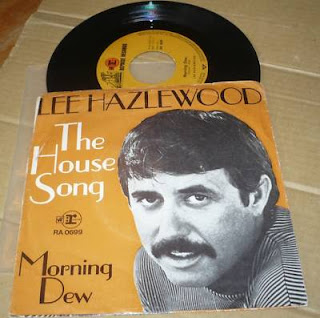Now there's no more morning dew
What they were sayin' all these years is true
'Cause there's no more morning dew
All of the versions of "Morning Dew" that were previously featured on 2 or 3 lines were recorded in the sixties.
I haven't exhausted the sixties covers of the song -- Lulu (of "To Sir With Love" fame) recorded it . . . as did Duane and Gregg Allman (before the Allman Brothers Band was formed) . . . as did Lee Hazlewood (best known for his collaborations with Nancy Sinatra) . . . as did the Grateful Dead.
I haven't exhausted the sixties covers of the song -- Lulu (of "To Sir With Love" fame) recorded it . . . as did Duane and Gregg Allman (before the Allman Brothers Band was formed) . . . as did Lee Hazlewood (best known for his collaborations with Nancy Sinatra) . . . as did the Grateful Dead.
(I was tempted to feature one of many live Grateful Dead versions of "Morning Dew." After all, the Grateful Dead were a hugely popular band, and they performed this song live for decades. But that temptation passed quickly when I listened to a few of the band's performances of "Morning Dew." Generally speaking, the Dead were godawful musicians. It's become a cliche to observe that the popularity of the group is largely explained by the fact that their audiences were usually as high as kites, and would have cheered lustily for the screeching of a couple of unneutered cats having at it in an alley fight.)
There were plenty of covers of "Morning Dew" in the subsequent decades as well -- including those by Nazareth, Clannad, Long John Baldry, Devo, Screaming Trees, Led Zeppelin alumnus Robert Plant, Mungo Jerry, and Serena Ryder.
One of the more interesting "Morning Dew" covers from the eighties was the one done by Einstürzende Neubaten (a German avant-garde group). Click here if you'd like to hear it.
I think it's time to bring the "Morning Dew" series to an end -- I don't want to try your patience too much. (After all, I already try the patience of some of you more than enough with pictures of Kim Kardashian's posterior.) Today 2 or 3 lines is featuring a 1997 cover of "Morning Dew" by Fatal Shore.
 |
| The Fatal Shore album |
A lot of Johnny Cash songs featured what was termed a "freight train" rhythm -- boom-chicka-boom-chicka-boom, etc. Fatal Shore's cover of "Morning Dew" features that rhythm and has a "western" (as opposed to country-western) feel generally.
That's odd given that the band was formed in Berlin, Germany, in 1996. And that's odd given that the founders -- the late Bruno Adams and Phil Shoenfelt -- were born in Australia and England, respectively.
According to the official Fatal Shore website, Adams and Shoenfelt originally got together for a tour of war-torn Bosnia-Herzegovina. During that tour, they were fired upon by Serbian snipers and attacked by axe-wielding mujahideen. While they were in Slovakia the next year to record their debut (and eponymous) album, Fatal Shore was held captive on a train by Ukrainian guest workers who wanted to hear one more song.
 |
| Shoenfelt and Adams |
After the death of Bruno Adams in 2009, Shoenfelt and Fatal Shore drummer Chris Hughes formed a new band called Dim Locator (whatever that means). They describe their music as "stripped-down industrial psych[edelic]-rock with influences from The Stooges, Beasts of Bourbon, The Birthday, Pink Fairies and Hawkwind." So many bands, so little time . . .
Here's the Fatal Shore's cover of "Morning Dew":
Click here to buy this track from Amazon:





























